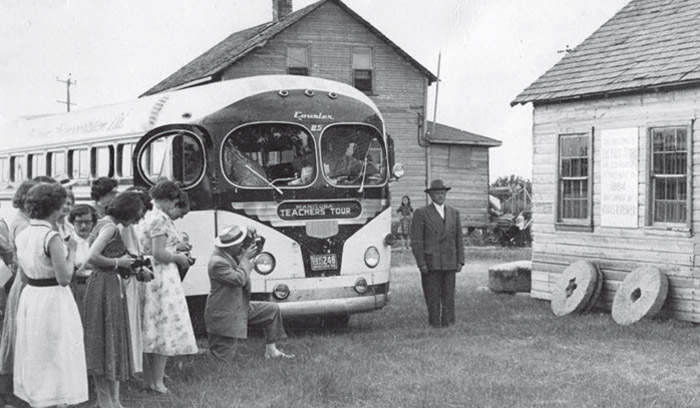Klaas Reimer was an accomplished blacksmith by the age of 20, and from his own shop, he earned a reputation for quality farm implement manufacture and repair. Crop failures in the 1860s wiped out the need for his work, and he was forced to abandon his shop and rely on the Kleine Gemeinde to settle his debts. As grain prices rose several years later, he started earning profits making plows and reinvested his earnings into farmland, becoming quite prosperous and farming more than 100 acres in 1873.
Klaas and his first wife Katharina crossed to Canada on the Hibernian, arriving on August 27, 1874 with their eight children. He used his assets from the property he had sold in Russia to purchase two lots, Wirtschaft 9 & 10, and was a significant owner in the 3-storey steam-powered mill built with Peter K. Barkman in 1878. He began to sell goods from his house on consignment from businesses in Winnipeg, and eventually opened Steinbach’s first store in 1884, which can be visited on the MHV grounds.
Klaas’ first wife Katharina is believed to have suffered significantly from mental illness, even when they lived in Russia, and Klaas’ efforts to find a cure were in vain. After her death in 1875 he would go on to marry twice more, first to Helena Warkentin, who passed away 1884 and Margaretha Klassen, who outlived him. Klaas fathered 25 children in total, 17 of whom survived.
Klaas and his sons would become very successful businessmen in the regional communities. By the 1890s, he, along with four of his sons and one son-in-law owned three general stores, the flour mill, four cheese factories and a saw mill. The 1898 tax roll found these five men paying almost half of Steinbach’s taxes, despite 78 households being on the roll.
With as many children as Klaas had, the stories of their families are too diverse and many to tell, but this second generation of Reimers was unique in Steinbach. The Kleine Gemeinde were quite restrictive about marrying outside of the Mennonite tradition, or even marrying people of other Mennonite denominations. Several children married ethnic Germans, one married and Anglo-Canadian, and several moved to Chicago to pursue careers. The youngest Reimer child, Franz, had a reputation of being a “character.” He managed to talk his way into military service at the age of 14 and was wounded in battle in France in 1917. In the 1950s he had moved to live on a mountain the BC’s Fraser Valley.
For a larger chronicle of the Reimer children, see Ralph Friesen, Between Earth and Sky, 93-106.




